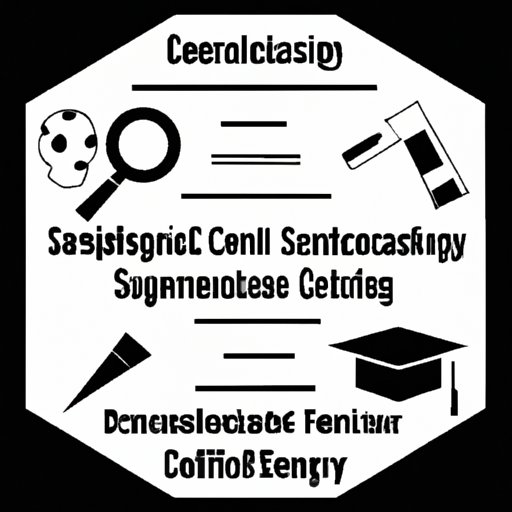Introduction
Forensic science is a broad field that encompasses the use of scientific principles to analyze evidence in criminal and civil investigations. Forensic scientists can work in law enforcement, crime labs, or private organizations. Depending on their specialization, they may be responsible for analyzing fingerprints, DNA samples, or other forms of evidence. With the right education and training, individuals can have a rewarding and successful career in forensic science.
Definition of Forensic Science
Forensic science is an interdisciplinary field that combines elements from chemistry, biology, physics, and other sciences to examine physical evidence and solve crimes. As explained by Dr. Richard Saferstein, former Director of the New Jersey State Police Crime Laboratory, “Forensic science is the application of scientific principles and processes to the recognition, collection, examination, and evaluation of evidence in criminal and civil investigations.”

Overview of Career Paths Available
Individuals interested in pursuing a career in forensic science can choose from a variety of paths. For example, some may prefer to work in a law enforcement agency as a crime scene investigator (CSI) or evidence technician. Others may opt to work in a laboratory setting, such as a crime lab or private testing facility. Additionally, there are opportunities to work with attorneys, providing expert testimony in court cases.
Obtaining a Bachelor’s Degree
Most entry-level positions in forensic science require a bachelor’s degree in a natural science such as chemistry, biology, or forensic science. It is also important to take courses in math, physics, and other relevant subjects. Many schools offer a concentration or minor in forensic science and provide students with hands-on lab experience.
Choosing a Major
When selecting a major, it is important to consider which area of forensic science you are most interested in. For example, if you are interested in analyzing DNA samples, you should consider a major in genetics or biochemistry. If you are interested in working as a crime scene investigator, you may want to pursue a major in criminal justice.
Benefits of a Bachelor’s Degree
A bachelor’s degree provides a solid foundation for a career in forensic science. In addition to learning about the scientific principles behind evidence analysis, students gain valuable problem-solving and critical thinking skills. This knowledge and experience can make them more attractive to employers.
Advanced Degrees and Certifications
While a bachelor’s degree is typically required for entry-level positions in forensic science, advanced degrees and certifications can improve job prospects and earning potential. For example, a master’s degree in forensic science can open doors to supervisory and management positions, while certifications can demonstrate expertise in specific areas of the field.

Considerations for an Advanced Degree
When deciding whether to pursue an advanced degree, it is important to consider the cost and time commitment involved. An online master’s degree program may be a good option for those who want to continue working while attending school. Alternatively, many universities offer full-time programs that can be completed in one to two years.
Licensure Exams and Certifications
In addition to obtaining a degree, individuals seeking employment in forensic science must pass a licensure exam and/or obtain certification in their specialty. The American Board of Criminalistics (ABC) offers several certifications, including Certified Forensic Scientist and Certified Forensic Technician. These credentials demonstrate professional competence and expertise in the field.

Taking Courses Related to Forensic Science
In addition to completing a degree program, it is important to take courses related to forensic science. These classes will provide a deeper understanding of the principles and techniques used in the field. Popular courses include chemistry, anatomy and pathology, and other sciences.
Chemistry
Chemistry is a key component of forensic science. Students should take courses in analytical chemistry, toxicology, and drug identification. They should also become familiar with the various instruments and equipment used in laboratories.
Anatomy and Pathology
Courses in anatomy and pathology can help students understand how the human body works and how injuries or illnesses can affect it. In addition, these topics can provide insight into cause of death and disease progression.
Other Sciences
Aside from chemistry and anatomy, students should take courses in other sciences such as physics, mathematics, and computer science. These courses can provide a better understanding of the scientific principles behind evidence analysis.
Gaining Experience in the Field
In addition to formal education, individuals seeking a career in forensic science should gain practical experience in the field. Internships and volunteer positions are a great way to gain hands-on experience and make valuable connections. Working with professional organizations can also provide insight into the industry and help individuals develop their skills.
Internships and Volunteer Positions
Internships and volunteer positions can provide invaluable experience and help individuals explore different areas of the field. These opportunities can also lead to paid positions or provide a stepping stone to a full-time job.
Professional Organizations
Joining professional organizations is a great way to network and stay up to date on the latest developments in forensic science. Membership in organizations such as the American Academy of Forensic Sciences (AAFS) and the International Association for Identification (IAI) can provide access to educational resources, conferences, and job postings.
Conclusion
Forensic science is a fascinating and rewarding field that requires a combination of formal education and practical experience. To get started in forensic science, individuals should pursue a bachelor’s degree in a natural science such as chemistry, biology, or forensic science. Advanced degrees and certifications can improve job prospects and earning potential. Additionally, internships, volunteer positions, and professional organizations can provide valuable experience and connections. With the right education and training, individuals can have a successful and fulfilling career in forensic science.
(Note: Is this article not meeting your expectations? Do you have knowledge or insights to share? Unlock new opportunities and expand your reach by joining our authors team. Click Registration to join us and share your expertise with our readers.)
